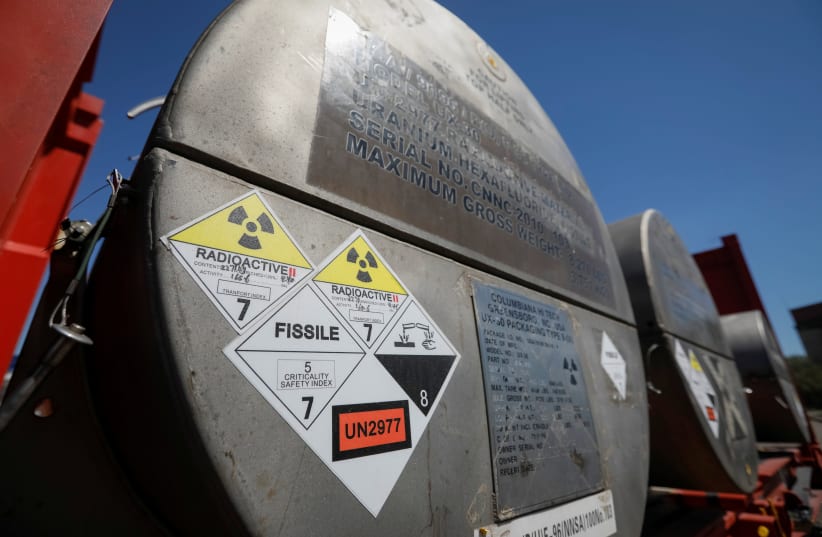Nuclear deterrence is a delicate matter that can determine the world’s fate, and the coronavirus crisis could put the entire equation out of whack, the Bulletin of the Atomic Scientists said in a position paper.
The Bulletin is one of the leading agencies that follow nuclear issues and is famous for its periodic presentation of the Doomsday Clock.
Last week, associate editor John Krzyzaniak wrote about common risks that the US, Russia, the UK, France and China face during the coronavirus era.
If any of these powers’ nuclear forces lose their ability to operate, that country and potentially the balance of forces between NATO allies and eastern nuclear powers could be thrown off and lead to unpredictable conflict.
Though Krzyzaniak does not address Israel specifically, Jerusalem’s presumed nuclear deterrent (according to foreign sources) is one of the threats that keep some of its adversaries at bay.
Krzyzaniak started with risks to US nuclear readiness.
The Bulletin quoted two high-ranking US officials involved with nuclear forces who guaranteed in recent weeks that their forces “remain ready to execute the nation’s strategic deterrence mission” and that, despite the COVID-19 outbreak, “its nukes are still ready to fly.”
Analyzing the comments by these officials, Krzyzaniak wrote: “Rhetoric notwithstanding, the US nuclear mission and its analogues around the world rely heavily on people, and people are exactly what the virus is after.”
Within days of the US officials’ attempts to reassure the public and deter American adversaries, Newsweek reported that US nuclear and associated forces have 106 uniformed personnel off duty due to coronavirus.
On April 9, Hans Kristensen, director of the Nuclear Information Project at the Federation of American Scientists, tweeted the stunning disclosure that all US nuclear bases except one had confirmed cases of COVID-19.
Kristensen named Barksdale AFB (bombers), F.E. Warren AFB (bombers), Kirtland AFB (storage), Minot AFB (bombers/ICBMs), Offutt AFB (NC3) and Whiteman AFB (bombers) as having confirmed infections.
That is the general picture of how the coronavirus could immobilize what might otherwise be a firm nuclear deterrent.
But there are much more specific problems for some countries.
For example, the Bulletin said England’s nuclear deterrent is based on a single platform, its submarines.
In early April, The Times reported that two of Britain’s four nuclear-armed submarines have been under repairs for the last year, Krzyzaniak noted.
The Bulletin said with only two operational submarines left, the British Royal Navy “has almost no margin for error in dealing with the coronavirus.”
Quoting Sebastian Brixey-Williams, co-director of the London-based British American Security Information Council, he said corona “poses profound questions about how prepared the [Royal Navy] is to cope with the COVID-19 pandemic. Were a Trident submarine to go on patrol only to find that one of its sailors had brought the virus aboard, the captain would have no option but to return to port or else risk the lives of the crew.”
This could break England’s round-the-clock deterrence mission, which is expected to be uninterrupted to be credible.
The US, Russia and France all also rely to some degree on nuclear-armed ballistic missiles at sea.
Regarding the US, Krzyzaniak said it has 14 nuclear-armed submarines, while Russia has 10, though some of those are under maintenance at any given time.
Regarding France, though it only has four nuclear-capable submarines, he said it has not had the same maintenance problems as the British fleet.
Regarding China, Krzyzaniak quoted Tong Zhao, a senior fellow at the Carnegie Endowment for International Peace, who said China’s nuclear submarine fleet is also vulnerable to the virus.
Compared to land-based missile forces and aircraft units, submarines have a greater challenge both because of their inability to receive external support during deployment and because of their relative lack of operational experience, Krzyzaniak wrote.
However, China relies much less on the sea-based leg of its triad, compared with Western nuclear powers, he said.
The threat to submarines can also be extrapolated from problems already faced on aircraft carriers, Krzyzaniak wrote.
France’s sole aircraft carrier, which plays a role in its air force’s nuclear-strike missions, returned home on April 12 with at least 50 cases on coronavirus onboard.
Similarly, Forbes reported: “The entire crew of a Russian [non-nuclear armed] submarine has reportedly been quarantined after indirect contact with a confirmed case of COVID-19.”
Four different US aircraft carriers have reported COVID-19 cases onboard, including the much-publicized case of the USS Theodore Roosevelt, whose captain set off an internal storm in the US Navy.
Another potential vulnerability for China is that it keeps nuclear warheads in constant circulation between central storage at a base in the Qingling mountains and other locations, the Bulletin said.
In light of these threats, the US, China and other countries are scaling down exercises. Some countries are putting sailors into a 14-day pre-departure quarantine, and some are training their personnel to carry out multiple roles if necessary.
Worldwide nuclear war or a surprise attack on the US or NATO allies is far from likely. But like everything else in the age of coronavirus, nothing can be taken for granted.
